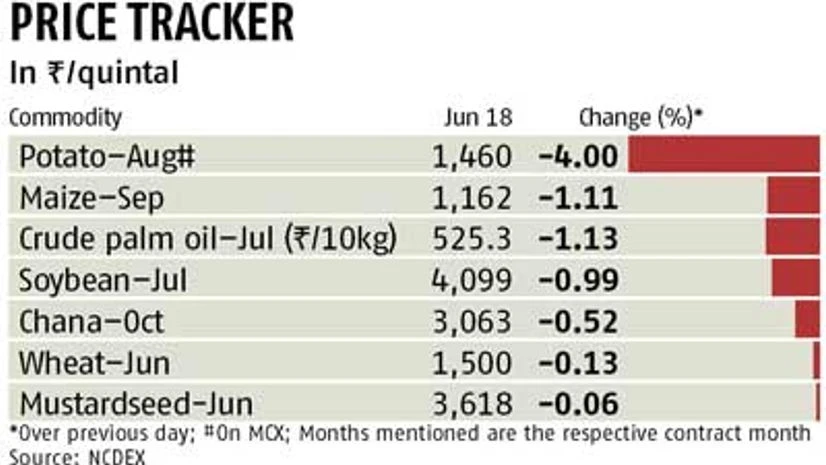The price control measures announced by finance minister Arun Jaitley on Tuesday on agricultural commodities are likely to help cool inflation in these in the coming months rather than at present, say observers.
On Wednesday, the futures exchanges saw a moderate fall in some essential commodities’ prices; potato fell more, by four per cent. Prices of potato and onion have risen 53 per cent and 26 per cent in the past 10 weeks in Delhi’s wholesale markets due to reports of crop damage and interrupted supply, on unseasonal rainfall. Data compiled by the food ministry showed potato at Rs 1,625 a quintal in the Delhi mandi on Wednesday from Rs 1,063 a quintal on April 1. Similarly, onion was Rs 1,163 a quintal from Rs 925 a quintal a fortnight earlier.
This trend in agri commodities raised the wholesale price index rise to a five–month high of 6.01 per cent in May from 5.2 per cent in April. Jaitley had announced a number of corrective measures, including action on hoarders of onion and potato.
“Delisting of fruits and vegetables from the Agricultural Produce Market Committee Act will hold potential increases in the prices of these food items. Also, there is no reason for food inflation to be so high when so much of cereals remain stored with the government. Hence, the government’s move is in the right direction, which will help control prices in future more than now,” said D K Joshi, chief economist, CRISIL.
Potato prices for delivery in the current month hit the lower circuit of four per cent on the Multi Commodity Exchange, to trade at Rs 1,379 a quintal. All far-month futures for potato were also down four per cent on the MCX. Similarly, chana prices for delivery in October fell by 0.5 per cent to trade at Rs 3,063 a quintal on the National Commodity & Derivatives Exchange. Soybean for July delivery was down one per cent at Rs 4,099 a quintal. In the spot market, however, prices of essential commodities remained almost unchanged.

Arrivals from Madhya Pradesh, Delhi, Uttar Pradesh, Bihar and Karnataka are going to deplete in a couple of months. After that, the entire country will seek supply from Maharashtra, which will push up prices, said Gupta. The minimum export price (MEP) of $300 on onion is at least 25 per cent less than the prevailing one of $400 a tonne. Hence, the MEP does not make sense, said Ajit Shah, president, Horticulture Exporters Association.

)
